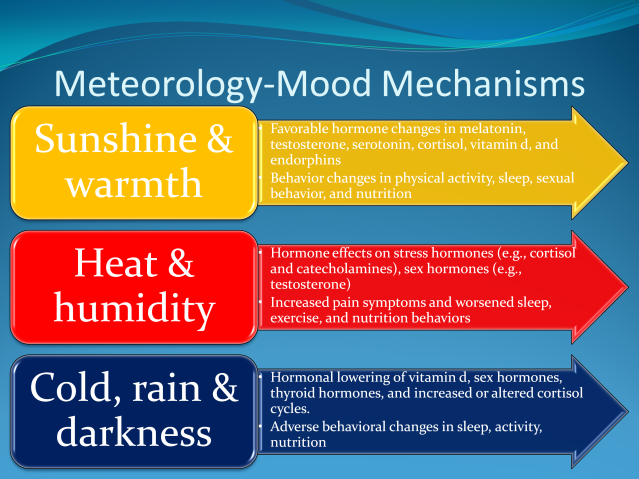- calendar_month March 2, 2023
- folder Health
KEY POINTS
- Although people have long anecdotally attributed mood changes to the weather, science has been slow to catch up.
- The weather outside affects us on the inside by influencing biological factors such as hormones and altering our lifestyle habits.
- We can minimize seasonal mood changes and maintain more consistent mood states using behavioral and nutritional strategies.
Whether you reside in sunny San Diego, showery Seattle, blustery Buffalo, or hot and humid Houston, it is a common question to wonder: Does the weather outside affect how we feel on the inside? Does cold or rainy weather really worsen mood, sunshine improve happiness, and heat and humidity make us irritable - as anecdotes and observational research suggest1 - or are these mood and meteorology experiences just another example of the remarkable power of cultural beliefs and confirmation bias to shape our perceptions of reality2?
Mood and meteorology science
Evolutionary science does not contradict the possibility of a climate-emotion relationship. As human beings, we are not just organisms living with Mother Nature—we are her creation and her children. For thousands of millennia, we evolved under Nature's tough love influence, shaping our bodies, our senses, and our brains to survive and successfully reproduce. Appreciating our eons-long history as humans evolving in environments made dangerous in part by ever changing weather conditions makes plausible the theory that certain mood and behavior changes could have originated in our ancestors as adaptive responses, including the likelihood of individual differences in these responses (Mother Nature would be an unpopular politician: she loves variation and inequity).

Source: Thomas Rutledge
New and recent biological science also highlights biobehavioral mechanisms through which weather conditions could favorably or adversely affect our emotions. The above figure summarizes human laboratory and meta-analytic review data examining biological and behavioral changes related to different weather conditions.
Sunshine and warm (not hot) weather are likely to result in improved mood, health, and well-being in many people3-4. Sustained cold and inclement weather, on the other hand, also induces a host of hormonal and health behavior changes, yet in directions and magnitude that could result in worsened affect5-6. Finally, higher temperatures and humid conditions are reliably linked in empirical reviews to both poorer physical and mental health, effects that may in part result from changes in neurobiology and behavior7.
Optimizing weather influences on mood
Although individual variation is critical to appreciate in interpreting meteorological effects on mood, the above science provides a biobehavioral basis for the connection suggested by many subjective reports. Even more importantly, this body of science provides insight into the precise pathways that we could intentionally self-regulate to optimize our mental health across daily and seasonal weather patterns.
For those prone to seasonal affective symptoms, for example, increasing morning light exposure (including light therapy alternatives to sunshine), obtaining regular exercise, practicing regular sleep schedules, using strategic supplementation (e.g., vitamin d) and maintaining quality nutrition habits have been shown to reduce symptoms and even prevent episodes. Sunlight benefits on hormones and health behavior changes are equally potent in the spring, summer, and fall, and could become consistent conscious practices during these seasons rather than unconscious trends. And those in hotter and humid climates could potentially mitigate mood swings by implementing strategies to cool their sleeping environments, maintain hydration, and obtain quality nutrition and safe forms of physical activity.
While we do not have to move to Hawaii for mood benefits from better weather, this research suggests that we do need to strive to maintain reliable health practices even in challenging climates if we want to feel our best.
Summary
For many people, mood changes in response to weather conditions may be a direct effect of altered biology and behavior patterns. Fortunately, however, we need not be passive victims to the conditions outside. Whether in the cold of winter, the heat of summer, or the wet conditions of spring and fall, we can take steps to optimize mood benefits and minimize mood deficits through conscious behavioral strategies.
